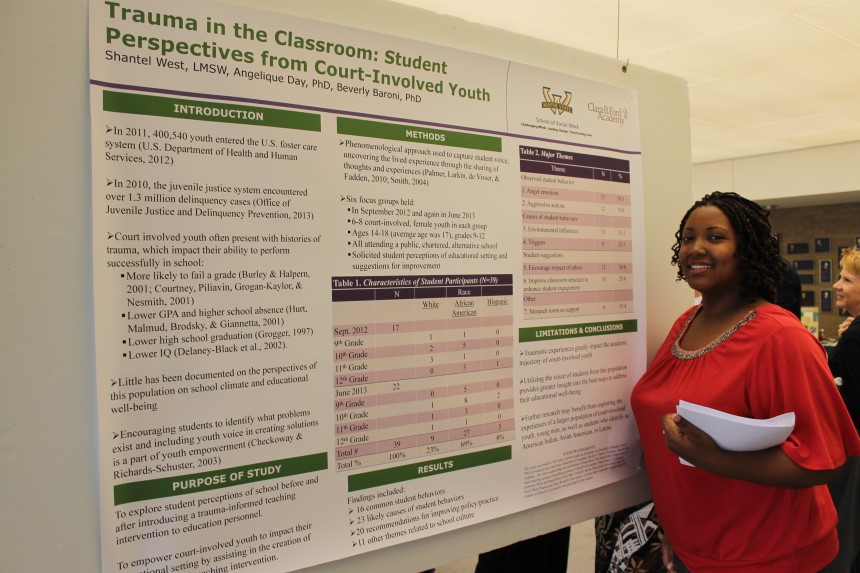Social Work Doctoral Student Spotlight: Shantel D. Crosby, L.M.S.W.

Shantel D. Crosby, L.M.S.W.
Trauma-informed teaching interventions for high-risk students
Professional Biography
A licensed clinical and macro social worker, Shantel has worked within the juvenile justice system as a community-based mental health therapist, providing home-based, outpatient, and school-based services. In 2011, she co-founded 5 H.O.P.E., a community service non-profit organization formulated to improve educational, behavioral health, and juvenile justice outcomes in the city of Detroit through community health and behavioral health events, tutoring, and education services to local youth. After entering the Doctoral Program in 2012, she served as staff of Wayne State's Transition to Independence Program (TIP) for the support and retention of students aging out of foster care. A recipient of Wayne State's Rumble Fellowship (2012-13, 2014-15), Wayne State's King Chavez Parks Future Faculty Fellowship (2013-16), and a doctoral fellowship from the Council on Social Work Education's Minority Fellowship Program (2015-16), Shantel has co-authored more than 14 research articles (accepted or under review), contributed to book chapters and policy briefs, and presented on her research to national audiences. She earned an M.S.W. and a Bachelor of Arts in Psychology, both from University of Michigan.
Research/Dissertation
Shantel is interested in the well-being and educational outcomes of court-involved youth, especially youth of color. For her dissertation, Shantel is examining one of the first trauma-informed teaching interventions designed to improve school climate and increase the amount of seat time court-involved youth spend in the classroom. The intervention is being implemented at the all-girl Clara B. Ford Academy in Dearborn Heights, Mich., which aims to reduce disciplinary issues and foster positive peer interaction by providing an effective social-emotional learning environment, emphasizing self-regulation and social skills, and encouraging responsible choices. Shantel is analyzing data from school-administered surveys and focus groups to produce three related dissertation papers: 1.) a qualitative focus on students' perceptions of their school environment; 2.) a quantitative assessment of student PTSD symptoms, self-esteem, and school attachment before and after the intervention; and 3.) a quantitative examination of suspension and expulsion at the school, coupled with a qualitative exploration of student perceptions of trauma-informed, alternative disciplinary practices used at the school.
Why It's Important
According to Shantel's dissertation advisor, Assistant Social Work Professor Angelique Day, the child welfare and juvenile justice systems historically have not prioritized the education well-being of youth in their care. "There is a plethora of research out there that documents the poor outcomes of these youth, but little has been done to train teachers or provide schools with tools to successfully work with these youth to maximize their well-being," notes Day, a national expert on foster youth and policy advisor to the state and federal governments. A test of one of the first trauma-informed teaching interventions designed to improve school climate and increase the amount of seat time court involved youth spend in the classroom, Shantel's research will inform educators' understanding of the way that students with a history of trauma learn and behave in the classroom. "Hopefully my work will show the need to shift from an authoritarian paradigm that emphasizes teachers' power and control to one that is more sensitive to the issues these youth are facing," Shantel said.
Faculty Support
Joining Day on Shantel's dissertation committee are Assistant Social Work Professor Jun Sung Hong, Associate Professor Debra Patterson, and Cheryl Somers, professor and director of the School and Community Psychology Program of the Wayne State College of Education. Day describes Shantel as "a student with great foresight and a hunger for learning. She has been working with me on research since the first year she was a doc student. And she didn't just seek out me; she has worked with at least three faculty I know of on various research projects. She is quickly becoming "" or may already be "" the most published doctoral student in the program. It has been my great pleasure to work with her on her doctoral journey, and I look forward to continued partnerships long after she graduates."
To read about other social work doctoral students and the research they are pursuing, click here: http://socialwork.wayne.edu/phd/student-spotlight.php